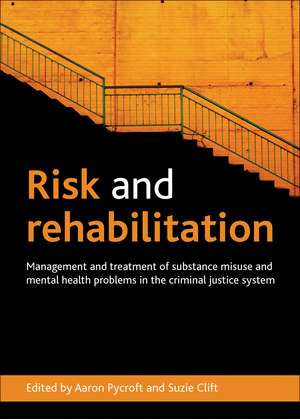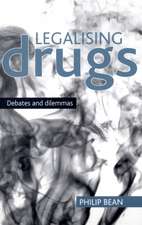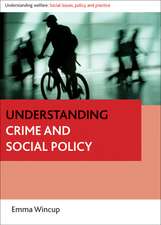Risk and Rehabilitation: Management and Treatment of Substance Misuse and Mental Health Problems in the Criminal Justice System
Editat de Aaron Pycroft, Suzie Cliften Limba Engleză Paperback – 15 oct 2013
Substance abuse and mental health problems constitute a significant proportion of the concerns of the criminal justice system. In answer to the rise of these issues, the justice system increasingly uses court orders to force individuals into treatment programs. In this volume, the contributors examine rehabilitation as it works under these court orders, analyzing the efficacy of the judicial approach. Exploring key features of service delivery, partnership arrangements, and the professional and ethical dilemmas that arise, they highlight perspectives from service users themselves, providing rare and valuable insight for criminal justice research.
| Toate formatele și edițiile | Preț | Express |
|---|---|---|
| Paperback (1) | 393.74 lei 6-8 săpt. | |
| Bristol University Press – 15 oct 2013 | 393.74 lei 6-8 săpt. | |
| Hardback (1) | 830.48 lei 6-8 săpt. | |
| Bristol University Press – 9 oct 2012 | 830.48 lei 6-8 săpt. |
Preț: 393.74 lei
Nou
Puncte Express: 591
Preț estimativ în valută:
75.35€ • 81.82$ • 63.29£
75.35€ • 81.82$ • 63.29£
Carte tipărită la comandă
Livrare economică 23 aprilie-07 mai
Preluare comenzi: 021 569.72.76
Specificații
ISBN-13: 9781447300212
ISBN-10: 1447300211
Pagini: 216
Ilustrații: 1 figure, 3 tables
Dimensiuni: 171 x 241 x 15 mm
Greutate: 0.41 kg
Editura: Bristol University Press
Colecția Policy Press
ISBN-10: 1447300211
Pagini: 216
Ilustrații: 1 figure, 3 tables
Dimensiuni: 171 x 241 x 15 mm
Greutate: 0.41 kg
Editura: Bristol University Press
Colecția Policy Press
Notă biografică
Aaron Pycroft is a senior lecturer in addiction studies at the Institute of Criminal Justice Studies at the University of Portsmouth. Suzie Clift is a senior lecturer in criminology at the University of Greenwich.
Cuprins
List of contributors
Introduction
Aaron Pycroft and Suzie Clift
1. The numbers game: a systems perspective on risk
Paul Jennings and Aaron Pycroft
2. Risk, assessment and the practice of actuarial criminal justice
Suzie Clift
3. The Mental Health Act: dual diagnosis, public protection and legal dilemmas in practice
Graham Noyce
4. Risk and rehabilitation: a fusion of concepts?
Dennis Gough
5. Seeking out rehabilitation within the Drug Rehabilitation Requirement
Bernie Heath
6. The Mental Health Treatment Requirement: the promise and the practice
Francis Pakes and Jane Winstone
7. The Alcohol Treatment Requirement: drunk but compliant
Aaron Pycroft
8. Community Orders and the Mental Health Court pilot: a service user perspective of what constitutes a quality, effective intervention
Jane Winstone and Francis Pakes
9. Therapeutic jurisprudence, drug courts and mental health courts: the US experience
Katherine van Wormer and Saundra Starks
10. Relationship and rehabilitation in a post-‘what works’ era
Aaron Pycroft
Index
Introduction
Aaron Pycroft and Suzie Clift
1. The numbers game: a systems perspective on risk
Paul Jennings and Aaron Pycroft
2. Risk, assessment and the practice of actuarial criminal justice
Suzie Clift
3. The Mental Health Act: dual diagnosis, public protection and legal dilemmas in practice
Graham Noyce
4. Risk and rehabilitation: a fusion of concepts?
Dennis Gough
5. Seeking out rehabilitation within the Drug Rehabilitation Requirement
Bernie Heath
6. The Mental Health Treatment Requirement: the promise and the practice
Francis Pakes and Jane Winstone
7. The Alcohol Treatment Requirement: drunk but compliant
Aaron Pycroft
8. Community Orders and the Mental Health Court pilot: a service user perspective of what constitutes a quality, effective intervention
Jane Winstone and Francis Pakes
9. Therapeutic jurisprudence, drug courts and mental health courts: the US experience
Katherine van Wormer and Saundra Starks
10. Relationship and rehabilitation in a post-‘what works’ era
Aaron Pycroft
Index
Recenzii
“The chapters in this volume are of a high quality and examine the nature of risk and rehabilitation, especially the ways in which the risk paradigm has distorted both rehabilitative ideas as well as the practice of working with people who have multiple and complex needs. The final chapter in this book, ‘Relationship and Rehabilitation in a post “what works” era,’ is a particularly important contribution to the literature.”
“Edited by Aaron Pycroft and Suzie Clift, Risk and Rehabilitation focuses on risk and rehabilitation with reference to substance abuse and mental health problems. The chapters in this volume are of a high quality and examine the nature of risk and rehabilitation, especially the ways in which the risk paradigm has distorted both rehabilitative ideas as well as the practice of working with people who have multiple and complex needs. The final chapter in this book, “Relationship and Rehabilitation in a post ‘what works’ era,” is a particularly important contribution to the literature.”
“A topical, insightful collection, drawing useful insights from both research and practice, on contemporary developments in working with offenders who are highly stigmatised and face substantial barriers in seeking desistance and reintegration.”










